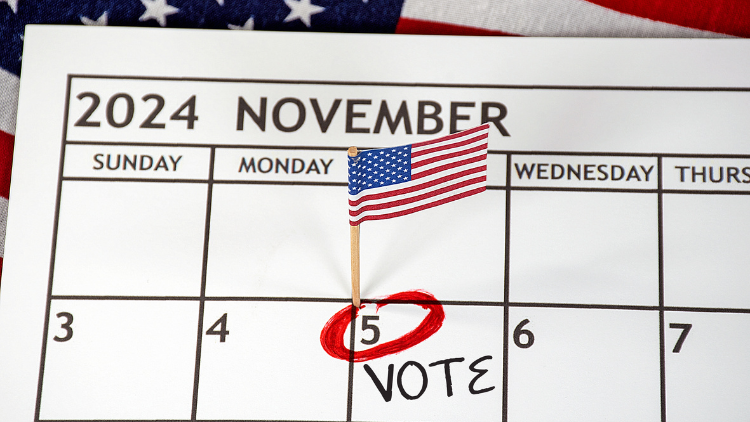Pakistan’s Perspective
Pakistan’s Perspective on the 2024 U.S. Elections

Flag on Election 2024 November Calendar
© By liveslow from Getty Images via Canva ProAs the United States approaches its 2024 presidential election, Pakistan finds itself at a crucial diplomatic juncture, closely monitoring the U.S. election as Donald Trump and Kamala Harris contend for the presidency. For Pakistan, the stakes and implications are profound: each candidate presents divergent foreign policy trajectories, and the election’s outcome will decisively shape U.S.-Pakistan relations, especially in security cooperation and economic ties, while also impacting regional power dynamics involving India and China.
The Trump Legacy: Security and Economic Challenges for Pakistan
Donald Trump’s first term (2017–2021) left U.S.-Pakistan relations in a fragile state by cutting $1.3 billion in security aid, accusing Pakistan of harboring militant groups, including the Taliban. This move strained bilateral ties and disrupted long-standing military training programs between the two countries. Additionally, Trump’s deepening ties with India through the Quad alliance have distanced Pakistan, positioning New Delhi as Washington’s preferred partner in South Asia, especially in countering China’s influence.
If Trump returns to office in 2024, the implications for Pakistan will be multifaceted. While some Pakistani-Americans view Trump’s prior rapport with Imran Khan as an opportunity for renewed political engagement, many remain skeptical due to concerns over Trump’s unpredictable foreign policies. Trump's transactional foreign policy, evident in his decision to cut aid over Pakistan’s counterterrorism shortcomings, signals that Trump’s second term could sustain pressure on Pakistan—particularly regarding its ties with China and its role in Afghanistan.
Moreover, Trump’s antagonism toward China is likely to intensify. This could place Pakistan—a key player in China’s Belt and Road Initiative (BRI), and the China-Pakistan Economic Corridor—in a precarious position. A Trump victory could force Pakistan to balance its strategic alliance with China and its need for continued U.S. engagement in security and economic issues.
Harris and Policy Continuity: Stability With Caution
Kamala Harris, in contrast, offers a more stable but cautious approach to U.S.-Pakistan relations. As vice president, Harris supported the Biden administration’s decision to continue U.S. assistance to Pakistan. This included a $101 million aid package aimed at counterterrorism and economic reform. This approach reflects the Biden-Harris administration’s broader recognition of Pakistan’s role in regional stability and counterterrorism, even as Pakistan strengthens its ties with China.
However, Harris’ Indian heritage and strong connections to the Indian-American community raise concerns in Islamabad that she might lean toward India in regional matters. Pakistan fears that under a Harris presidency, increased U.S.-India defense cooperation could further marginalize its role in Washington’s South Asia policy.
Harris is likely to continue the support for initiatives like the Green Alliance, which helps Pakistan address climate change, promote renewable energy, and improve water management. Given Pakistan’s dependency on international assistance after the 2022 floods, these collaborations will likely remain a cornerstone of U.S.-Pakistan relations under Harris.
The Role of the Pakistani-American Diaspora
With over 625,000 Pakistani-Americans living in the U.S., the diaspora wields considerable influence. This influence is especially notable in swing states like Texas, Michigan, and Pennsylvania. Historically, Pakistani-Americans have leaned toward the Democratic Party. However, disappointment with U.S. foreign policy—particularly regarding Gaza—has caused many to reconsider their loyalties (Migration Letters).
Within the U.S., Pakistani-Americans are divided. Some view Trump’s populism and past affinity for Imran Khan as reasons to support his return, while others are wary of Trump’s erratic foreign policy, which previously complicated Pakistan’s strategic interests. Harris’ moderate stance and emphasis on diplomatic engagement are likely to attract Pakistani-Americans focused on long-term U.S.-Pakistan cooperation.
Economic Ties and Strategic Partnerships
Despite geopolitical uncertainties, Pakistan’s economic relationship with the U.S. remains a central pillar of bilateral ties. The U.S. is Pakistan’s largest export market, with trade exceeding $5 billion annually as of 2023. The U.S. is also a significant investor in Pakistan, particularly in sectors like energy, agriculture, and technology. These economic connections are vital to Pakistan’s financial stability. They are particularly crucial as Pakistan grapples with inflation, debt, and the long recovery from the 2022 floods.
USAID programs and the U.S.-Pakistan Green Alliance have been instrumental in helping Pakistan recover economically and build resilience to climate change. These initiatives will likely continue under a Harris presidency, with a focus on promoting sustainable economic growth and infrastructure development.
In contrast, Trump’s focus on reducing foreign aid and tightening trade policies could disrupt these efforts. While Trump’s transactional approach may bring short-term gains in security cooperation, it risks undermining long-term economic partnerships, pushing Pakistan to deepen its reliance on China.
Conclusion: Pakistan’s Diplomatic Crossroads
As Pakistan anticipates the outcome of the 2024 U.S. elections, it stands at a critical diplomatic crossroads. A second Trump presidency could create challenges for U.S.-Pakistan relations, particularly in security and economic engagement. To address this, Pakistan must adopt a proactive diplomatic approach, focusing on open dialogue and collaboration on shared interests such as counterterrorism, climate change, and regional stability.
Conversely, a Harris presidency may offer continuity and opportunities for deeper cooperation in trade and economic development. Yet, Pakistan must be ready to constructively engage with human rights issues.
Success will depend on Pakistan's diplomatic agility and its ability to balance relationships with both the U.S. and China. Strengthening educational and business ties with the Pakistani-American diaspora can play a vital role in fostering mutual understanding and support. Ultimately, the future of U.S.-Pakistan relations will hinge on Pakistan's strategic positioning and its ability to navigate the shifting dynamics of a multipolar world.
